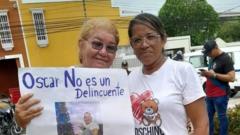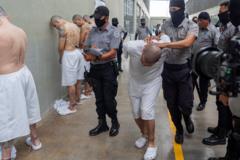The plight of 238 Venezuelans deported by the U.S. to El Salvador's infamous Cecot prison is drawing widespread outcry, particularly from families like Gertrudis Pineda, who fear for their loved ones' safety and well-being while questioning the legality and humanitarian implications of their detention.
Venezuelan Deportees Face Despair in El Salvador's Mega-Prison

Venezuelan Deportees Face Despair in El Salvador's Mega-Prison
Families of Venezuelans deported from the U.S. are voicing their anguish over the uncertain fate of their loved ones in a notorious Salvadoran prison, raising concerns over due process and human rights.
Gertrudis Pineda's world has darkened since her son Oscar was deported by the U.S. to a maximum-security prison in El Salvador, known as the Cecot, where conditions are said to be brutal and devoid of humane treatment. Separated by borders and harrowing circumstances, she recalls Oscar's aspirations of achieving the American Dream, now seemingly buried under the weight of despair.
Oscar, who once lived in Dallas, Texas, supported his family by laying carpets and sending money home. However, the dream turned into a nightmare when he was detained by U.S. Immigration and Customs Enforcement. Initially believed to be on his way back to Venezuela, Gertrudis learned from her family that he had instead been sent to the Cecot, an infamous facility marked for housing gang members from the violent MS-13 and 18th Street gangs.
The U.S. government justified the deportation, accusing the Venezuelans of being affiliated with the Tren de Aragua gang. However, many, including Gertrudis, assert that these accusations are unsubstantiated. The deportees, whose heads were shaved and faces hidden behind prison uniforms, became collateral damage in a politically charged crackdown on crime.
Gertrudis, thousands of kilometers away in heat-stricken Zulia state, pleads for recognition of human rights and discloses little information regarding her son’s treatment. Concern over conditions at the Cecot, described as a “black hole of human rights” by activists, casts a shadow over her hopes. Reports reveal detainees endure cell restrictions that deny them even a ray of sunlight.
El Salvador’s President Nayib Bukele champions the Cecot as an effective measure against gang violence, despite discontent from various quarters. Critics, including Salvadoran immigration expert Napoleon Campos, argue that the deportations are unconstitutional, pointing out that many have no criminal records. Campos believes this situation reflects a broader crisis of legality and human rights violations occurring throughout El Salvador.
While Gertrudis cries out for justice, the task of navigating the complex legal landscape for the imprisoned Venezuelans has fallen upon Jaime Ortega, a representative appointed by the Venezuelan Vice-President. Ortega remains hopeful but recognizes the unprecedented nature of this mass deportation, calling for more transparency over their handling.
The national environment continues to be charged with silence as the government remains steadfast against criticism, boasting high approval ratings for its crime-fighting measures. Residents in neighborhoods previously plagued by gangs express some relief but also acknowledge that innocent individuals have been swept up in the ongoing crackdown.
For Gertrudis, the pain of separation grows heavier as she tends to Oscar's eight-year-old son while grappling with the uncertainty of her son's fate. She connects with mothers of Salvadoran inmates, speaking vehemently against unjust detentions, emphasizing, “They must send them home.”
The haunting reality of criminal justice in El Salvador, particularly for the vulnerable Venezuelan deportees entangled within a political struggle, underscores a dire call for change and restoration of hope for many families facing this profound tragedy.





















